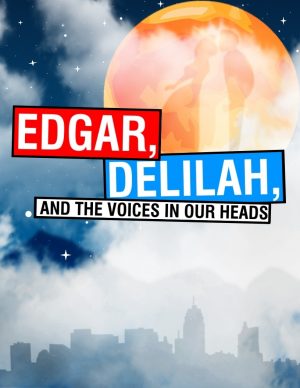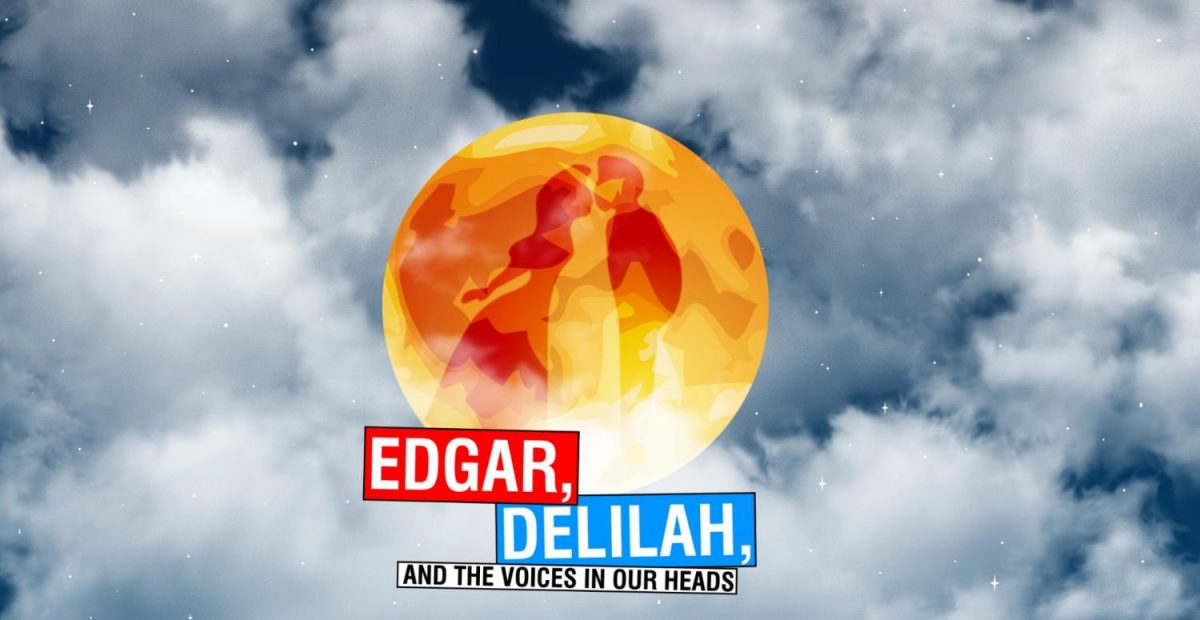School Play Delights
Edgar, Delilah & the Voices in Our Heads Review
March 21, 2017

Plato famously once observed that the ancient Greeks believed that human beings were originally created with four arms, four legs and a head with two faces. Because the gods feared the power of these original humans, Zeus cut them in half, condemning them to wander the earth in search of the missing part that would make them whole. From this search comes the search for love and the sense that we can only truly be complete when joined with our original half, the soul mate who can literally make us whole.
That search has been the premise of plays since Plato’s time, and the Helena High Theater Department recently offered its excellent take on the subject in Declan Garrison’s “Edgar, Delilah, and the Voices in our Heads,” which complicated the already challenging search for love with a zany cast of characters including friends, groupies, and most notably, the very voices in our heads that sometimes tell us to pursue love and at other times to run far away. And fast.
At its heart, the play is a sweet, even simple love story about a boy named
Edgar and the girl he happened to meet on a school bus and later lost contact with. Much of the play’s drama is centered on Edgar’s desire to be reunited with Delilah and Delilah’s perhaps more mature, more worldly realization that being attracted to each other may not be enough to bring them together. Both of the romantic leads were played with a sweet sincerity by actors Mariela Certian and Jada Lecce, who succeeded in making the audience quite invested in their story, even though most of their romance takes place in conversations about each other, not with each other. There wasn’t a person in the theater who wasn’t deeply invested in their story, rooting for the two to end up together.
Most of the time the leads are talking to themselves, or to versions of themselves, two voices each “trapped” in the body of the teenager they have some, but not nearly enough control over. This, the central conceit of the play, is that both characters have voices in their heads, voices that hector and cajole, persuade and push the romantic leads to act on their feelings. And it’s the interaction between the characters and their voices that creates the heart of the performance and gives it its unique energy.
The standout performance of the play was Erin Longdon, a senior, who played Edgar’s Voice with a physical intensity that was a joy to watch. It’s little wonder that he won Outstanding Performance in a comedy at the Missoula Thespian festival, as his crisp delivery of lines and energetic performance had the audience laughing and feeling the frustrations he felt when he couldn’t seem to get Edgar to accept the most obvious truths about his band, his love, or even his life at a favorite diner.
Longdon and Corrina Asher (as Delilah’s voice) add just the right notes of cynicism and exuberant hope to the voices of their characters. Their performance left this reviewer wanting a sequel exploring the friendship between the two voices, both of whom seemed both a bit wiser and wittier than Edgar and Delilah, who spent much of the play besotted by love.
In addition to the main plot, the play explored a more traditional teenage love story between Edgar’s dim, but good-hearted band mate, Stephen (played by Brandon Maciel) and his groupie Hannah (played) by Megan Cuddy. Their story humorously explored the zone between dating and not, ironically observing contemporary concerns like when a relationship becomes “Facebook official,” surely one of the most pressing concerns of our time or any other.
Writer and director Garrison deservedly won Outstanding Student Writing for his script, which, while acknowledging the absurdity of young love, gave it truth and authenticity. In their short time together, “Edgar and Delilah” is an earnest and honest look at love, one that recognizes that the sweet fear of its anticipation and even the reality that often complicates it is worth the risk. There’s a tendency in our culture to dismiss young love, but Garrison’s script, while realistic, reminded the audience that perhaps we shouldn’t mock those moments when our passion literally lifts us out of our seats and ourselves.
Perhaps most importantly, it reminded its audience that when the voices in our heads tells us to leap, to take risks we’re not sure we should, we’d better listen, because that missing half might just be looking for us.



